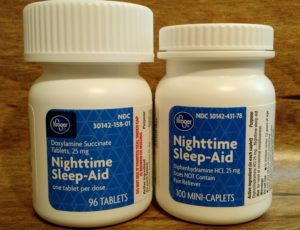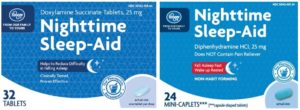Over-the-Counter Sleep Aids Warning…but it’s not the warning you’re expecting
We all know how important it is to read the labels of the medications we take, right? You do read your medication labels, don’t you?
Most of us know it’s important, but many of us don’t actually do it.
When you’re taking a prescription drug, you have your doc to advise you, and your pharmacist too. But what about when you choose an over-the-counter medication for a particular symptom you’re experiencing?
I’d venture to say most of us have at least five OTC medications in our medicine cabinets. Pain relievers – maybe a few different kinds, allergy and sinus, cold and flu, antacids and other – ahem – digestive-type remedies, topical first aid creams and ointments. And of course, sleep aids.
We quickly read over the labels when we’re choosing at the store or online, and then maybe again when we first use them. After that, we’re confident that we know the drill and take them like we’ve always taken them.
Well, recently I had a conversation with my friend (I’ll call him Jay), who had a rather alarming experience, and it really woke me up (pun intended!) to how important it is to ALWAYS read labels when taking medications. Even generic or store-brand OTC medications.
Jay’s Story
Jay has an erratic work schedule, and this can sometimes cause him trouble getting the sleep he needs. We were discussing his “untraditional” sleep patterns, and he related to me that he occasionally needs a little bit of help and how he found it.
He started his OTC sleep aid journey several years ago when Vick’s ZzzQuil first came out, and found it really helped him. He doesn’t need it all that often, but if he knows he’s really going to need to be well rested, or has the feeling something is going to hinder him easily falling asleep or staying asleep (heightened neighborhood activity or noise), or if he just can’t get to sleep within an hour of lying down, the ZzzQuil has been a great help to him.
At some point, he noticed that drug and grocery stores had come out with their own generic versions of the same drug and started buying Kroger brand’s version at his local Fry’s Food & Drug instead to save a few bucks.
Every so often he needed more, and he’d grab whichever package was the cheapest per dose. He didn’t much care whether it was a gel-cap or a tablet, in a bottle or blister packs. He took it home, opened it up, and started taking it like always.
Recently, Jay realized that the dosage had changed. He had been accustomed to taking two of the tiny blue tablets (no, not those!) and had continued to do that with each new package he bought. He happened to read the package one night, and it said to take one tablet.
One tablet?
Not two?!?
But…..before it said….oh boy.
Jay realized he had been taking double the recommended dose, and he didn’t know how long he had been doing it. When had he last bought this stuff anyway?
What he found was that there were two different store brand versions, and their packages and labels looked almost identical to each other for those two completely different medications. Kroger labels their store-brand Diphenhydramine HCl, 25mg (ZzzQuil, Sominex, Unisom SleepGels) and their store brand Doxylamine Succinate 25mg (Unisom SleepTabs) so similarly that it’s tough to even notice they are different. Jay certainly didn’t.
See what I mean?


This is not to pick on Kroger brand products – it could be the same with any other generic or store brand.
Different Medications, Different Doses
The Doxylamine Succinate’s recommended dose is one tablet, and the Diphenhydramine HCl’s recommended dose is two tablets.
Very confusing!
Luckily, Jay is okay and hasn’t suffered any major problems. He mentioned that he may have had more trouble waking up some mornings, but he hadn’t made the connection between taking the sleep aid or not. I mean, it’s always kind of hard to wake up, right? But he certainly didn’t intend to be double-dosing himself.
I don’t want to minimize the potential problems here. Taking more than a recommended dose of any medication could be trouble. Jay just happened to realize his dosing mistake and is now aware of the need to read the label with each new package he buys.
These OTC sleep aids can really be helpful when you have trouble getting to sleep or staying asleep. Nothing wrong with trying a little antihistamine therapy, especially if it’s for a short period of time, or you use it only occasionally. It’s inexpensive, and you don’t have to make a doctor’s appointment.
But Jay’s story is a good reminder of how important it is to always read labels, make sure we know exactly what we’re taking each time, and how to properly take our medications (supplements too) of all kinds. Thanks Jay!
